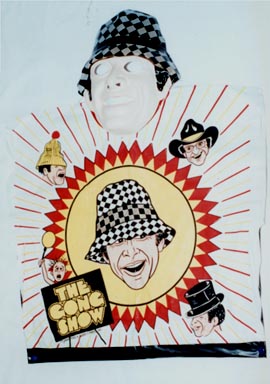Let's not suppose, though, that Kaufman is about some sort of juxtaposition between the 'real' and the 'fantastic.' In fact, the two categories are interdependent - not independent of one another. Bill Nichols, the documentary film scholar, has (somewhat self-servingly) categorized all films as either "documentaries of social representation" or "documentaries of wish-fulfilment." Nichols uses these terms because he wants to stress that our psychic life is just as real, and just as difficult to document, as our physical life (and conversely that the representation of our physical life is just as ideologically fraught as that of our psychic life). He doesn't use the term wish fulfilment in a simplistic way to mean 'ambition fulfilment,' but in a more psychologically rich way where 'wish fulfilment' is how people play out their strangest conscious and unconscious wishes-like a dream consciously structured by someone else.
The three Kaufman films mentioned earlier are all centrally about the combination of 'social representation' and 'wish-fulfilment.' Being John Malkovich, Confessions of a Dangerous Mind and Adaptation are about how screen-creators are both agents and victims of the need for wish fulfilment, and how the lines between the business of dreams and the 'responsibility' of social representation cannot be maintained.
 This is true even for game-show-host Chuck Barris. In Confessions, Barris believes in the Gong Show because it shows how desperate people are to emulate their celebrity idols and, at the same time, how ready their fellows are to laugh at them and tear them down to size. He has realized The Dating Game and The Gong Show; they have become a part of his daily life; and they are immediately colonised by the mundane. As the pressures of wish fulfilment come to bear, Barris searches for ever more extreme escapes, finally transposing the 'fiction' of entertainment onto his 'real' life by inventing the fantasy of his life as a secret agent. Barris sought to imbue fantasy with reality, and ends up filling reality with fantasy.
This is true even for game-show-host Chuck Barris. In Confessions, Barris believes in the Gong Show because it shows how desperate people are to emulate their celebrity idols and, at the same time, how ready their fellows are to laugh at them and tear them down to size. He has realized The Dating Game and The Gong Show; they have become a part of his daily life; and they are immediately colonised by the mundane. As the pressures of wish fulfilment come to bear, Barris searches for ever more extreme escapes, finally transposing the 'fiction' of entertainment onto his 'real' life by inventing the fantasy of his life as a secret agent. Barris sought to imbue fantasy with reality, and ends up filling reality with fantasy.
Clearly Kaufman sees something of himself in this other Charles-another self-disgusted East Coast Ashkenazi creator of filmed games of human life. Both are ashamed of their own banal physicality. Both huddle impotently over typewriters that are - like the hole behind the cabinet on the 7 1/2th floor in Malkovich -- their portals to another world, another person.



strasbourg
cathedral
Michael Shurkin
the other rally
Sam Brody
what the world is &
what to do about it
Jay Michaelson
Treasure
Ron Mohring
sha'atnez
Abraham Mezrich
what is charlie kaufman doing?
Dan Friedman
josh visits the
holocaust museum
Josh Ring
saddies
David Stromberg
about zeek
archive